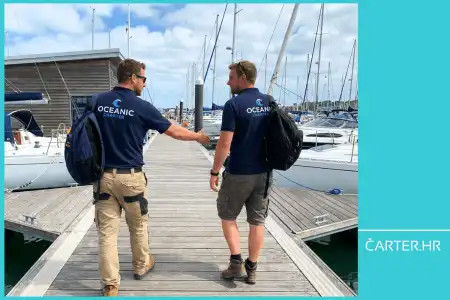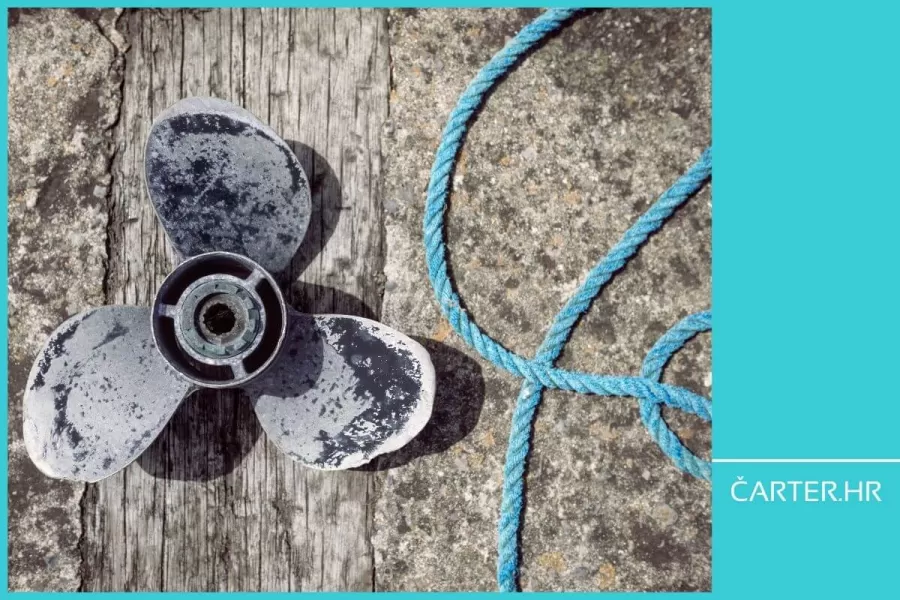
- 16.01.2024.
- News, Management
Corrosion can be a boat's enemy, but there are many ways to deal with it. Discover how corrosion occurs, why the marine environment is particularly challenging, and how to protect your vessel from its harmful effects.
Corrosion is inevitable - it destroys vessels, making them less safe and less functional.
Corrosion is not only unpleasant to the eye or a surface disturbance. It slowly but surely reduces the structural integrity of your vessel.
Corrosion is a serious matter and causes serious problems.
Due to corrosion, your boat can leak water, the load-bearing structures can weaken, and certain parts of the boat can even wholly disintegrate.
For the fight against corrosion, it is necessary to know what corrosion actually is and how it occurs.
What is corrosion, and how does it affect your vessel?
Corrosion is the erosion of materials, especially metals, that occurs due to a chemical reaction with gases or liquids. Other materials such as polymers and wood are not immune to corrosion either.
In corrosion, two different processes cause damage to materials, especially metals:
Chemical corrosion
Chemical corrosion occurs when the metal directly reacts with the environment. It is a process in which a metal changes its chemical composition due to exposure to chemical agents, such as oxygen or sulfur dioxide, in the air.
Example: iron, when exposed to moist air, forms iron(III) oxide or rust.
Electrochemical corrosion
Electrochemical corrosion involves electrochemical reactions between the metal and the environment, which requires the presence of an electrolyte (e.g. water with molten salts).
This type of corrosion occurs when there are two different electrochemical zones on the metal, one acting as the anode where the metal loses electrons (corrodes) and the other as the cathode where electrons are received.
Example: corrosion of metals in seawater, where saltwater serves as an electrolyte, allowing electron transfer and thus corrosion.
Seawater has a significant impact on corrosion, especially on yachts and vessels. The high salt content makes seawater particularly corrosive, an electrolyte.
The high salt concentration in seawater increases its electrical conductivity, which facilitates the transfer of electrons between the anodic and cathodic areas on the metal, accelerating the corrosion process and making the metal weaker and less resistant.
Different metals are often used on yachts and vessels, which can lead to galvanic corrosion. This occurs when two dissimilar metals are brought together in the presence of an electrolyte (in this case, seawater), causing the less noble metal (the anode) to corrode more quickly.
For these reasons, yachts and vessels require regular maintenance to protect them from the corrosive effects of seawater, including the frequent application of protective coatings, sacrificial anodes, and regular inspections and cleanings to minimize the possibility of corrosion.
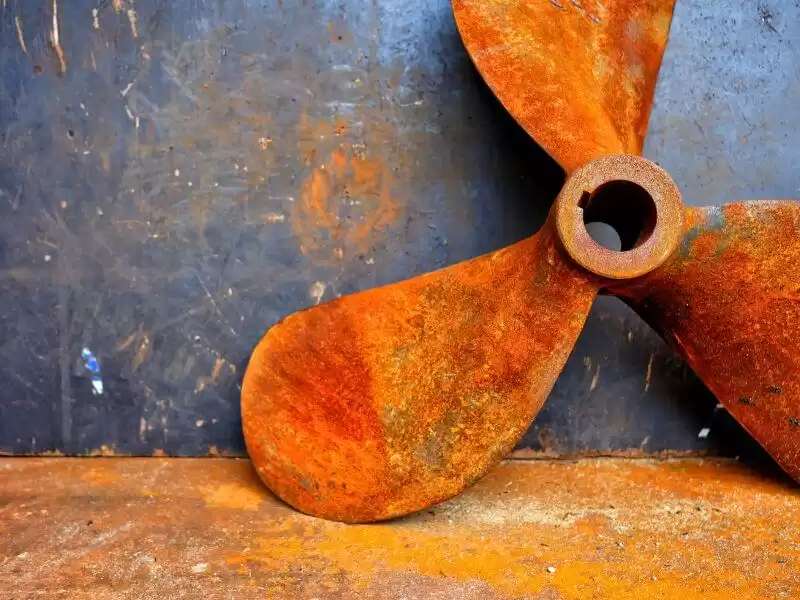
What causes and accelerates corrosion?
Numerous elements act as corrosion catalysts, accelerating the oxidation of metals and making corrosion inevitable, rapid and destructive. Some of the main factors are:
Electric currents in metal parts of the vessel - inadequate grounding of the vessel's electrical system can cause corrosion of metal components.
Bacteria and microorganisms - some microorganisms (such as bacteria that produce sulfur dioxide in ballast tanks) can produce substances that promote corrosion.
Climate change - vessels are more prone to corrosion in areas with higher temperatures and increased humidity because increased temperatures and humidity favour corrosion.
Oxygen from the air - metal parts of the boat above the waterline, exposed to air, subject to corrosion because oxygen reacts with the metal, promoting the oxidation process.
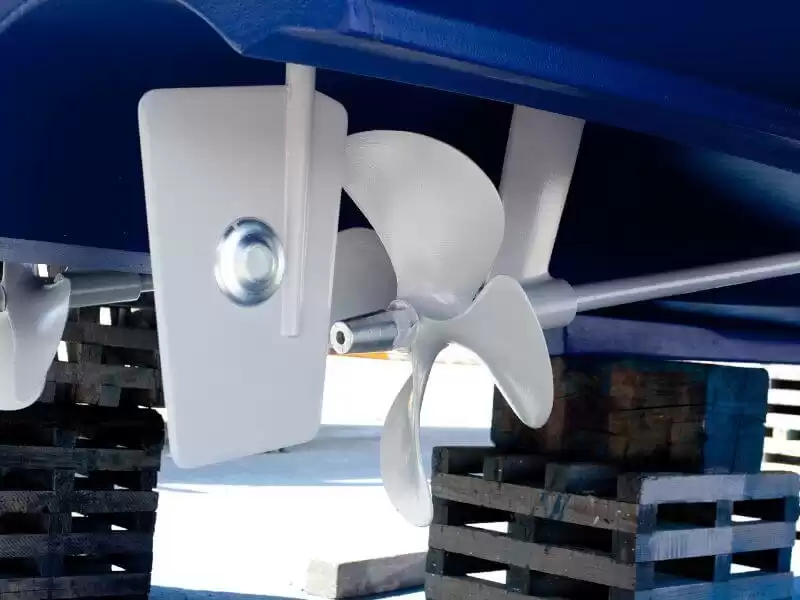
The most effective methods for corrosion protection
Of course, it is possible to protect your vessels from corrosion, and there are many effective tactics; these are some of the most effective methods:
- Sacrificial anodes - attract corrosion to themselves, protecting essential metal parts of the vessel. Sacrificial zinc anodes are often used on propellers and other underwater metal parts of a boat, where the anodes are the first to wear out instead of crucial components.
- Cathodic protection - cathodic protection uses an electric current to prevent corrosion and can help protect large metal surfaces on a vessel.
- Special coatings and paints - create a barrier that repels moisture and salt. Coatings, such as epoxy coatings, are applied to the hull and deck of a vessel to prevent water and salt penetration. Regularly apply coatings and anti-corrosion paints to metal surfaces to prevent corrosion of metal parts such as screws and connectors.
- Using non-corrosive materials - corrosion-resistant materials, where possible (such as stainless steel, aluminium, fibreglass or composite materials) significantly reduces the risk of corrosion.
- Regular maintenance and prevention - it is necessary to regularly check the condition of metal surfaces, clean them if necessary and carry out repairs.
Applying these methods significantly reduces the risk of corrosion, extending the service life and preserving the vessel's functionality in your yacht charter.
It is not enough to only periodically check and clean the visible metal surfaces; it is also necessary to adequately care for those hidden and harder-to-reach parts.
Regularly and thoroughly clean all metal surfaces, including the deck, railing, and anchor, to remove salt and other corrosive substances. Cleaning the boat after every trip to the sea reduces salt accumulation.
Pay special attention to hard-to-reach parts below the deck and inside the hull. Regularly inspect the interior chambers of the vessel to detect and repair early signs of corrosion in time.
Conduct thorough inspections to identify any anomalies or changes in the structure and appearance of metal parts, and regularly check and replace sacrificial anodes.
With regular and effective maintenance, you reduce the risk of corrosion, which significantly contributes to the preservation and reliability of your vessel.
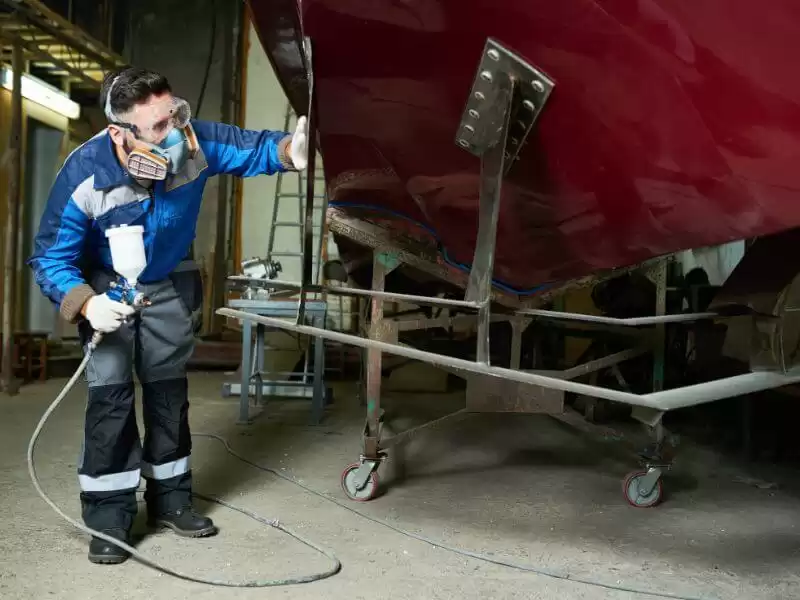
Conclusion
The fight against vessel corrosion is a routine process but requires a comprehensive approach.
Innovative technologies, such as smart sensors for early detection of corrosion, as well as the use of advanced corrosion-resistant materials, further improve the protection of vessels.
Innovative technologies ensure a longer vessel service life, thereby increasing their functionality.
Targeted and efficient corrosion protection on vessels has one goal - a future in which vessels are safer, more reliable and more resistant to challenges.
But of all the things mentioned above, regular boat maintenance and prevention are the foundation for preserving the longevity of your boat.
Categories of trends
- News
- Sale
- Marketing
- SEO
- Web design
- Social media
- Technology
- Regulations
- Management
- Education
- Finances
- User experience
Newsletter
Sign up for the newsletter and receive the latest trends and tips straight to your inbox


